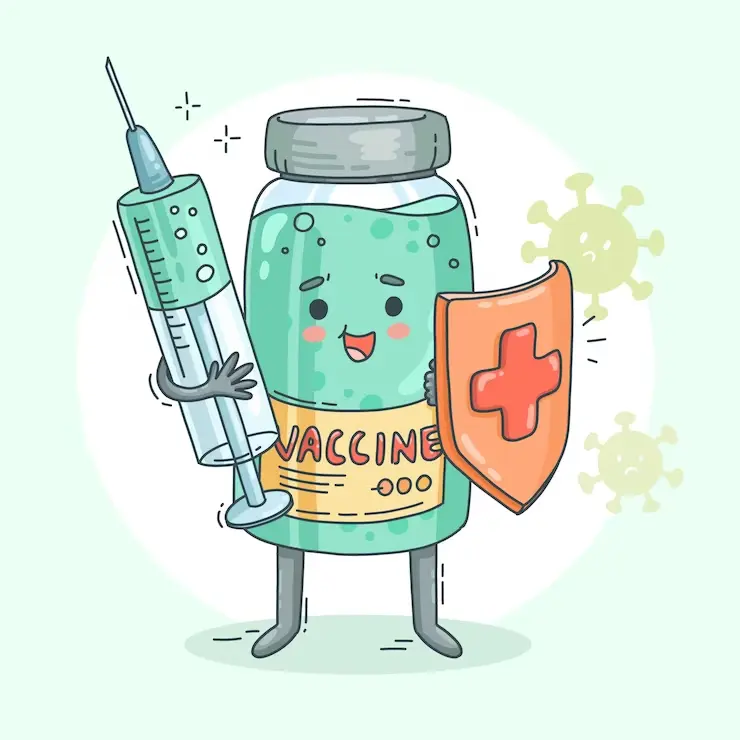Preventive Healthcare
Demystifying Immunizations and Vaccines: All You Need to Know
4063 Views
0

Understanding the significance of immunizations and vaccines is paramount to safeguarding public health. From preventive measures against infectious diseases to establishing a robust immunization schedule, this blog is your guide to what you need to know about vaccination.
What is Immunization?
Immunization is a critical and proactive approach to enhance your body's natural defence mechanisms against infectious diseases. It involves the administration of vaccines, which are composed of weakened or inactivated pathogens or their components. Your immune system recognises these antigens as foreign invaders, stimulating the production of antibodies and the development of immune memory. This memory enables your immune system to mount a rapid and effective response upon subsequent exposure to the actual pathogen, preventing or mitigating the severity of the disease.
Immunization plays a pivotal role in public health by preventing the spread of contagious diseases and protecting individuals and even entire populations. It has been instrumental in eradicating or controlling numerous infectious diseases, contributing to increased life expectancy and improved overall health worldwide.
Why Should Someone Get Immunized?
Immunization offers numerous benefits to people. Firstly, it provides personal protection by assisting your immune system to effectively combat specific diseases, reducing the risk of infection and severe illness. Immunization also contributes to community immunity or herd immunity, which occurs when a significant portion of the population is vaccinated, hindering the spread of diseases and protecting those who cannot be immunized, such as individuals with certain medical conditions or allergies. Additionally, widespread immunization efforts lead to the prevention of outbreaks, lowering the costs associated with treating and containing diseases in hospitals.
Which Immunizations Do My Children Need?
The recommended immunization schedule for your children typically includes vaccinations against several preventable diseases.
- Early Childhood(Birth to 2 years)
- Hepatitis B Vaccine: Administered shortly after birth, it provides early protection against hepatitis B, a potentially serious liver infection.
- DTaP Vaccine (Diphtheria, Tetanus, and Pertussis): Guards against three dangerous diseases, this vaccine is administered in multiple doses to ensure strong immunity.
- Hib Vaccine (Haemophilus influenzae type b): Offers protection against a bacterium that can cause severe infections, including meningitis.
- Polio Vaccine: A vital defence against poliovirus, preventing the potentially crippling effects of polio.
- Pneumococcal Conjugate Vaccine: Focuses on preventing diseases caused by the bacterium Streptococcus pneumoniae, such as pneumonia and meningitis.
- Mid-childhood Vaccines(4 to 6 years): As your child grows, ensure they receive important types of immunizations like MMR (measles, mumps, rubella), varicella (chickenpox), and hepatitis A for continued protection during key developmental stages.
- Adolescent Immunizations(11 to 18 years): Strengthen immunity during adolescence by incorporating vaccines like meningococcal conjugate and HPV to safeguard against specific infections relevant to this age group.
What About Immunization Side Effects?
Immunizations are generally safe and highly effective in preventing diseases, but like any medical intervention, they can be accompanied by side effects. Most side effects of immunizations are mild and transient. These can include redness or swelling at the injection site, low-grade fever, or slight fussiness in infants. These reactions are typically short-lived and signify your body's natural immune response. The occurrence and intensity of common immunization side effects can vary from person to person. Some individuals may experience minimal or no reactions, while others may have a slightly more pronounced response. This variability is normal and doesn't necessarily indicate a cause for concern.
While serious immunization side effects are extremely rare, they can still occur. Severe allergic reactions to vaccine components are an uncommon occurrence but can manifest as significant swelling or difficulty breathing. Note that these instances are outliers, and the overall safety profile of vaccines remains high. Advances in vaccine research and development aim to continually enhance the safety profiles of immunizations. Innovations in vaccine technology aim to minimise side effects while optimising the effectiveness of immune response.
How Effective Are Immunizations?
Immunizations are highly effective in preventing and controlling the spread of infectious diseases. The effectiveness of vaccines varies, but many have demonstrated remarkable success. For instance, vaccines against diseases like polio, measles, and smallpox have been instrumental in near or complete eradication. Contemporary vaccines continue to exhibit high efficacy rates. For example, vaccines against influenza, pneumonia etc substantially reduce the risk of infection and severe outcomes. Even if you are vaccinated and contract a disease, the symptoms are often milder compared to those in unvaccinated individuals. Immunizations prove to be cost-effective by averting medical expenses associated with treating diseases and preventing the economic burden of prolonged illness and hospitalisations. Rapid development and distribution of vaccines, as seen in responses to diseases like COVID-19, highlight their pivotal role in controlling the spread of infectious agents.
Vaccine Myths and Misinformation
Vaccine myths and misinformation pose major challenges to public health efforts worldwide. As scientific advancements continue to yield life-saving vaccines, the spread of unfounded claims can undermine trust in immunization programs.
One prevalent myth is the link between vaccines and autism. This misconception originated from the now-debunked studies that suggested a connection between the MMR (measles, mumps, and rubella) vaccine and autism. Numerous rigorous studies since then have found no such association. The scientific consensus overwhelmingly supports the safety of vaccines, and major health organisations, including the Centers for Disease Control and Prevention (CDC) and the World Health Organisation (WHO), emphatically refute any connection between vaccines and autism.
Another common misconception is the belief that natural infection is preferable to vaccination. Some argue that experiencing a disease naturally strengthens the immune system more effectively than receiving a vaccine. However, this perspective overlooks the potentially severe consequences of natural infections, including complications, long-term health issues, and the risk of death. Vaccines, on the other hand, provide a safer means of building immunity without the associated dangers of contracting the disease.
Concerns about vaccine ingredients also contribute to misinformation. Some worry about the presence of substances like thimerosal, a mercury-containing compound used as a preservative in some vaccines. Scientific studies consistently affirm the safety of thimerosal, and its removal from routine childhood vaccines in many countries has not resulted in a decrease in autism rates, further dispelling associated concerns.
Misinformation often spreads through social media platforms, where anecdotes and unverified claims gain traction. False narratives about vaccine injuries or adverse effects can disproportionately influence public opinion. Combating this requires a concerted effort by health authorities to disseminate accurate information and actively engage with the public through these channels.
Fear of side effects is another factor contributing to vaccine hesitancy. The benefits of vaccination in preventing potentially life-threatening diseases far outweigh the minimal risks of side effects.
Religious and philosophical exemptions are sometimes invoked, allowing individuals to opt out of vaccination on non-medical grounds. However, such exemptions can compromise herd immunity and increase the risk of disease outbreaks. Communities must understand that vaccination is not just a personal choice; it has broader implications for public health.
Public health campaigns must address these myths by emphasising the scientific rigour behind vaccine development, testing, and approval processes. Clear, accessible communication is key to dispelling misinformation. Legislation and policies mandating vaccinations for certain populations, such as schoolchildren, exist in many regions to ensure community protection. However, achieving high vaccination rates requires more than mandates; it requires open dialogue, empathy, and addressing concerns with evidence-based information which can reshape public perceptions and encourage vaccination as a collective responsibility.
Conclusion
The overwhelming benefits of immunization cannot be ignored and everyone should recognise its importance. Understanding the types of immunization and following recommended schedules helps you to proactively protect your health. Immunizations not only shield against preventable diseases but also contribute to herd immunity. In combating vaccine myths and misinformation, fostering a culture of understanding and trust is paramount.
If you are looking to check your vaccination status through precise and affordable antibody tests or complete immune status panels, Metropolis Labs is at your service. Trusted by the best doctors and hospitals across India, we are the frontrunners in comprehensive diagnostic services. Book your test today!























 WhatsApp
WhatsApp